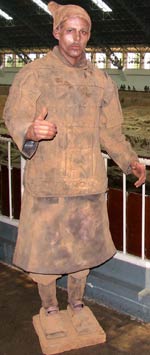[UPDATE: Live-blogging the Thai military’s coup, complete with great photos and on-the-street interviews. Go there.]
I’ll be back in Thailand in three week with my family, so this story certainly caught my eye. We’ve all heard about it by now, and all I can say is that I’m amazed.
In Thailand’s first coup in 15 years, military leaders seized control of Bangkok on Tuesday night, suspended the Constitution and declared martial law in the capital, effective immediately.
There were no reports of violence.
The moves came while Prime Minister Thaksin Shinawatra was in New York preparing to address the United Nations. He declared a state of emergency on Thai television, but was cut off in mid-speech. Later, he canceled his address to the General Assembly.
The coup, led by the army chief, Gen. Sondhi Boonyaratkalin, also ‘terminated’ both houses of Parliament, the cabinet and the Constitutional Court.
The events on Tuesday returned Thailand to a time that most experts here thought was finally past, raising questions about the future of Thai democracy and the stability of a country that is a prime tourist destination with strong economic links to the West.
The coup came at the height of a drawn-out political crisis. In April, Mr. Thaksin was forced by huge street protests to step aside despite an overwhelming electoral mandate. In fact, though, he continued to lead the government and to wage political battles against his opponents.
I never liked Thaksin, and while I’m not sorry to see him ousted, it’s never a good thing to see a democracy in peril. (Thaksin of course ignored the democracy, continuing to rule after he was voted out.) Where this will lead is anyone’s guess, and I suspect all eyes will soon be on the king, whom the Thai people adore with a religious fervor. Small wonder the first thing the army did was swear its allegiance to him. This will be one to watch closely.

Comments